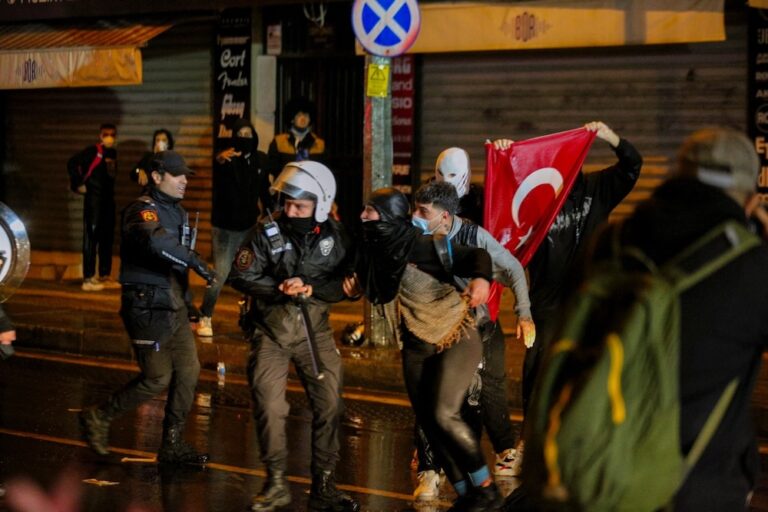Trial of journalists from defunct publication could be a litmus test for free expression in post-coup Turkey.
This statement was originally published on indexoncensorship.org on 1 September 2016.
On 2 September, the first hearing will take place in a trial concerning three former senior editors of Taraf daily newspaper, Ahmet Altan, Yasemin Çongar and Yıldıray Oğur; and two journalists, Mehmet Baransu and Tuncay Opçin. The undersigned organisations believe the trial to be politically motivated and call on the government to drop all charges against the accused and to immediately and unconditionally release Mehmet Baransu, who has been held in pre-trial detention since his arrest on 2 March 2015.
The charges pre-date the 15 July coup attempt, which the undersigned organisations also condemned; however, this is a high profile trial of journalists following the declaration of the State of Emergency in Turkey, under which at least 100 journalists have been detained. This trial is therefore of particular significance, as it may shed light on how the courts will approach cases concerning the right to freedom of expression and the right to a fair trial under the state of emergency – even when not directly related to the coup attempt.
ARTICLE 19, Index on Censorship, EFJ, Norwegian Press Association, Norwegian Journalists’ Union, PEN Germany, Danish PEN, PEN International, and Wales PEN Cymru are attending the trial.
THE CHARGES
The charges are detailed in a 276-page indictment, which was accepted on 20 June 2016 by the Istanbul High Criminal Court, 16 months after the initiation of the investigation. All five journalists are facing charges of acquiring, destroying and divulging documents concerning the security of the state and its political interests, punishable by up to 50 years in prison. Baransu and Opçin are facing additional charges of ‘membership and administration of a terrorist organization’ and face a possible 75-year prison term.
The charges of acquiring, destroying and divulging state secrets against the five journalists concern the ‘Egemen Operation’ plan – an out-of-date military war plan to respond to a Greek invasion. As a prior judgment of the Turkish Constitutional Court affirms, Taraf did not publish state secrets regarding this operation. Moreover, it is hard to see how the document could be considered a state secret; the Egemen Operation Plan was declared no longer in use in 2007, prior to when it was allegedly acquired by the journalists. Of even greater concern, the plan was actually made public in 2011 by a Court, when it was published in an indictment related to another case.
The charges of membership and administration of a terrorist organisation against Baransu and Opcin, refer to alleged affiliation with the Gülenist Terror Organisation (Fetullahçı Terör Örgütü, FETÖ), the group that the Turkish government accuses of being behind the failed coup in July. The first official reference to this group as a terrorist movement was in an indictment in May 2015, and it was only added to the official list of outlawed terrorist organisations in Turkey in May 2016 – six years after the period to which the charges relate.
The defendants deny all the charges.
PROBLEMS WITH THE INDICTMENT
The indictment presented by the prosecutor is highly problematic, containing a number of procedural deficiencies. In addition, failing to establish the facts against the defendants, it includes information about several offences that bear no relation to the proceedings at issue; and levies accusations against the defendants that are not included in the charges. The deficiencies include:
• The indictment accuses the defendants of propaganda for a terrorist organisation; but brings no charges on these grounds, nor does it provide any facts to support this.
• 46 pages of the indictment have been copied directly from an entirely separate indictment against Cumhuriyet editors, Can Dündar and Erdem Gül, who exposed illegal arms transfers by the Turkish Intelligence Service (MIT) into Syria and were sentenced to prison for five years for their reporting. The degree of direct reproduction is evident from the fact that one paragraph of the indictment even starts with the words ‘The Defendant Can Dündar’.
• Large parts of the indictment against the journalists focus on a series of controversial news reports, titled the ‘Balyoz (Sledgehammer) Coup Plan’, published in Taraf between 20-29 January 2010, about an alleged military coup to overthrow the Justice and Development Party (AK Party) government. However, the charges do not, in fact, relate to this story. Indeed, the indictment does not suggest Taraf’s decision to publish the Balyoz papers was criminal and Balyoz does not figure in the specific charges presented at all.
These deficiencies seriously undermine the credibility of the charges, increasing concerns that they are groundless and aimed at stifling opposition voices within Turkey.
FREEDOM OF EXPRESSION AND THE RIGHT TO A FAIR TRIAL
It is well established that no restriction may be imposed on freedom of expression on the grounds of national security unless the government can demonstrate that the restriction is necessary in a democratic society to protect a legitimate national security interest. The burden of demonstrating the validity of the restriction rests with the government.
Moreover, any restriction on journalistic activity – in this case the charges brought against the journalists – must have the genuine purpose and demonstrable effect of protecting a legitimate national security interest. As noted, the alleged state secret, the Egemen Secret Operation Plan, had already been published prior to charges being brought by a court, undermining the assertion that charges of acquiring, destroying and divulging this plan are necessary to ensure state security. This is reinforced by the disproportionately high sentences sought against the defendants. Restrictions must meet a sort of proportionality test, whereby the benefit in terms of protecting the interest must be greater than the harm caused to freedom of expression.
Additionally, national security concerns do not allow the government to waive the rule of law protections that are part of international law. This includes the right not to be arbitrarily detained and the right to be informed promptly of the charges against him or her. Mehmet Baransu, who has been held in pre-trial detention for 18 months, and had no charges served against him for a 15-month period, has had both of these rights violated.
We call upon the government of Turkey to drop the charges against the Taraf journalists. At a time when the Turkish government should be demonstrating its commitment to freedom of expression and the rule of law, it is pursuing highly questionable charges that seem to be aimed at stifling legitimate government criticism.
European Federation of Journalists
Norwegian Press Association
Norwegian Journalists’ Union
PEN Germany
My Media
Welsh PEN Cymru
PEN UK


